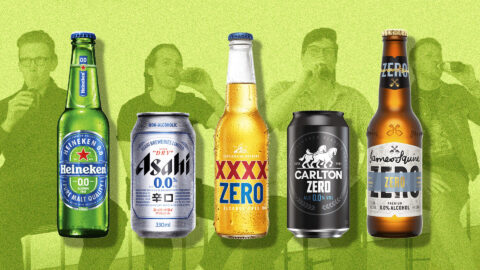- Low- and non-alcoholic beers, once deemed ‘un-Australian’ or ‘unmanly,’ are gaining acceptance as more Australians prioritize health and wellness.
- Campaigns like “Sober October” and “Dry January” have sparked a movement towards mindful drinking.
- Australian breweries are responding to the surge in demand by developing innovative low- and non-alcoholic beverages.
For a long time, low and non-alcoholic beers were considered ‘un-Australian’ and ‘unmanly’ – but that’s changing, and fast. Once stigmatised as a bland compromise, these beverages are now embraced by a wider audience of younger consumers, seeking a healthier, socially inclusive alternative without the next-day hangover.
But it’s certainly not isolated to just the next generation of would-be drinkers coming through. In Australia, we’ve seen a 70% increase in Google searches related to the benefits of quitting alcohol over the past five years, according to Alana Cauchi, Brand Manager, Australian Beer Co, with more non-alcoholic options becoming more prevalent in bars and bottle shops.
“Australians’ attitudes toward alcohol have shifted significantly since 2020, largely driven by a growing focus on physical and mental health,” Alana Cauchi told DMARGE.
“Many are prioritising holistic wellness, seeking balanced lifestyles that promote mindfulness, self-care, and self-improvement. For some, this means completely abstaining from alcohol, while others are reducing their intake to avoid compromising activities like Pilates or weekend sports.”

Our drink of choice for most of the 20th century was beer. And not just beer, but full-strength beer. Things might have changed a lot since then. According to the Australian Institute of Health and Welfare, wine has long supplanted beer as our alcohol of choice, and spirits consumption is also on the rise.
But just as outdated attitudes of masculinity or what constitutes ‘Australian’ are on the way out, our prejudice against mid-strength, low-alcohol or zero-alcohol beer is slowly diminishing too. Indeed, Australia is in the midst of a low-alcohol beer renaissance, with more options (and people drinking them) than ever before. And – if you’ll put down your pint for a second – that might actually be a good thing.
“The demand for alcohol-free options in Australia has surged, driven by a shift toward health and wellness.”
Alana Cauchi, Brand Manager, Australian Beer Co
Related Stories
“As a result, the market has seen an explosion of better-tasting, high-quality alternatives. Breweries, distilleries, and winemakers are now investing heavily in creating alcohol-free beverages that replicate the taste and experience of traditional alcoholic drinks”
WATCH our review of the 10 most popular non-alcoholic beers in Australia below.
Global campaigns like “Sober October” and “Dry January” have ignited conversations about the role of alcohol in our lives, encouraging many Australians to rethink their drinking habits and embrace a more health-conscious lifestyle. Think about it, we could all probably do with cutting down our alcohol intake, especially as the warmer months come in and that frosty schooner of something begins to sound like a good idea.
The momentum from these campaigns has contributed to a cultural shift where socialising without a drink in hand is increasingly normalised for Gen Z consumers who are either completely sober… or sober-curious, so to speak.
And as habits change, so too does the product. The rise of social media influencers and health advocates online has encouraged brands to break away from traditional alcoholic options, putting more emphasis on alternatives for sober customers.
“As the #1 premix market, Australia has seen tremendous growth in non-alcoholic ready-to-drink options.”
Alana Cauchi, Brand Manager, Australian Beer Co
“While traditionally known for its communal drinking culture—often centred around sports, BBQs, and outdoor activities— younger generations are redefining social drinking. They are seeking premium, alcohol-free options that fit seamlessly into these social settings, reflecting a broader shift toward moderation,” Alana Cauchi, Brand Manager, Australian Beer Co told DMARGE.

Recent years have seen smaller breweries rise to the occasion to produce low-alcohol bevvies that – shock, horror – are actually pretty nice to drink. We recently ranked a host of non-alcoholic beers for Dry July and were surprised to find that the majority of them could satisfy even the most discerning palate.
Gone are the days of watered-down wastes of drinks and lacklustre options; today’s Australian brewers are crafting bold, flavourful beers that show that just because it’s not full-strength, it doesn’t mean it doesn’t pack a punch.
“Traditional alcohol brands are responding to the demand for alcohol-free options by introducing non-alcoholic versions of their most popular products, such as Heineken 0.0% and Gordon’s 0.0%,” Alana Cauchi continued.
“This allows consumers to enjoy familiar flavours while making more health-conscious choices. Many brands are also developing entirely new alcohol-free ranges, including craft beers, wines, and spirits, to cater to the mindful drinking trend. In addition, companies are rebranding their messaging to emphasise responsible drinking, as seen in campaigns like Heineken 0.0%’s “Now You Can,” which highlights the freedom and versatility of alcohol-free consumption.”
With an ever-changing drinking landscape here in Australia, the future of drinking could be poised for further transformation. Now, I’m not saying to ditch the grog altogether. You can, but I’m not saying I will. But traditional notions of masculinity and cultural identity are evolving… and that’s not always a bad thing.




